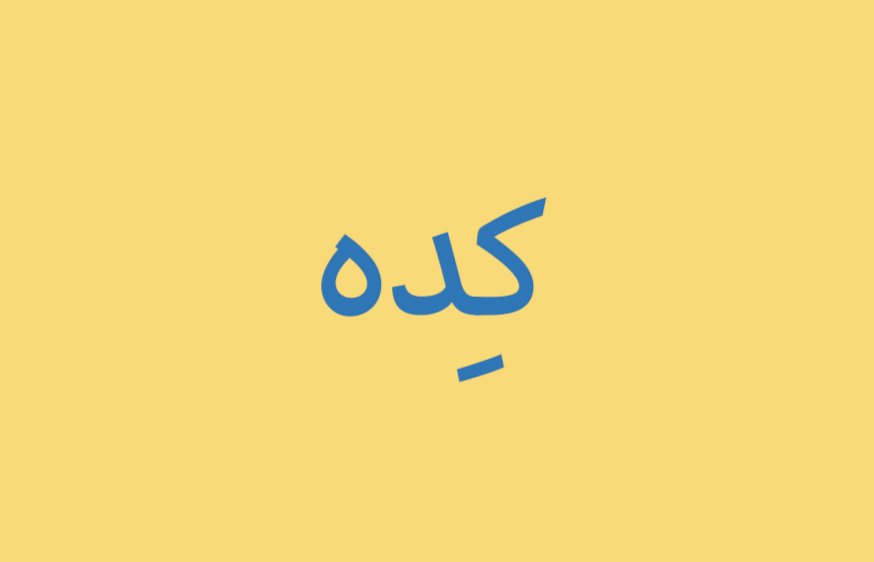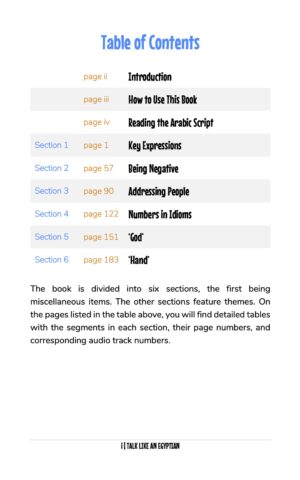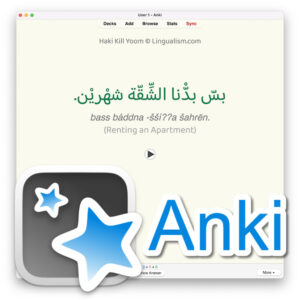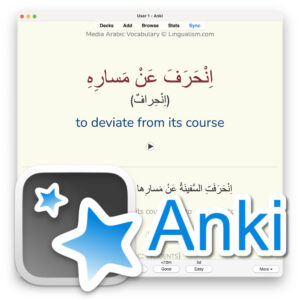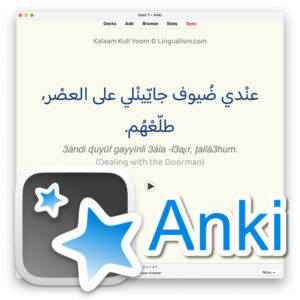The following is taken from segment 1 of Talk Like an Egyptian (by Alaa Abou El-Nour and Matthew Aldrich).
كِده is likely the most quintessentially Egyptian word there is. Not only is it very high frequency in everyday speech, but it is unique to the Egyptian Arabic dialect. كِده is related to the Modern Standard Arabic word هكذا like this but takes on a range of idiomatic meanings on its own and in phrases.
Table of Contents
Alaa’s Clubhouse Room
Follow along with Alaa and participants in her Clubhouse room as they go through the materials below and learn about the uses of كِده (keda).
The full episode of Alaa’s podcast TriPod can be found here.
Join “Talk Like an Egyptian” Clubhouse live ECA practice rooms every Saturday 4 pm Cairo time!
Like This
Many learners make the mistake of translating like this literally, as زيّ ده, but this only works if you mean such as this/him. If you mean to say this way or in that manner, you should use كِده.
أ: أطلّع القميص برّه وَلّا أخلّيه زيّ ما هُوَّ جُوّه البنْطلوْن؟
ب: لا سيبُه جُوّه البنْطلوْن. كِده شكْلُه أحْلى.
A: Should I untuck the shirt or leave it tucked into the pants?
B: No, leave it [tucked] inside. It looks better this way.
أ: هِيَّ الشّجرة بِتِتْرِسِم كِده؟
ب: أَيْوَه يا حبيبي، كِده مظْبوط.
A: Is a tree drawn like this?
B: Yes, dear. That’s correct.
Right?
مِش كِده functions as a question tag at the end of a sentence: ‘… right?’, ‘… isn’t that so?’
أ: أنا بقول نِعدّي على مْحمّد بِاللّيْل بعْد الغدا أحْسن، مِش كِده؟
ب: آه يِكون أحْسن برْضُه.
A: I assume it would be better if we go by Mohamed’s in the evening after lunch, wouldn’t it?
B: Yes, that’d be better.
Softener/Filler
Sometimes, كِده doesn’t really translate but serves to soften the sentence as a kind of filler.
أ: ها هنِنْزِل وَلّا أيْه؟
ب: خلّينا نِسْتنّى كِده شُوَيّة و بعْديْن نِنْزِل.
A: So, are we going out or what?
B: Let’s just wait a bit, then go out.
أ: على فِكْرة، دي آخِر مرّة هشْتِـري مِنْكُم!
ب: ليْه بسّ كِده يا مدام؟
A: By the way, this is the last time I’ll ever buy anything from you.
B: But why, ma’am?
So, Thus
كِده can refer back to something just mentioned: so, thus
أ: لازِم حدّ يِنْصح محْمود إنُّه يِرْجع الشُّغْل تاني.
ب: حِسيْن قالُّه كِده، بسّ المُشْكِلة إنُّه مْسافِر كمان أُسْبوع.
A: Someone has to advise Mahmoud to go back to work again.
B: Hussein did [told him so]… but the problem is that he’s going away in a week.
أ: أنا مِش قُلْتِلك لازِم تِروح لِدُكْتوْر قلْب؟
ب: ما أنا عملْت كِده فِعْلاً!
A: Didn’t I tell you that you should go see a cardiologist?
B: I did [so already]!
Super!
An enthusiastic كِده!, often accompanied by a thumbs-up, describes someone or something as great, super, perfect.
أ: و البوفيْه إمْبارِح كان عامِل إزّاي في الفرح؟
ب: لأ مقولّكْش… كان كِده!
A: And how was the buffet at the wedding yesterday?
B: Just wow! It was awesome!
مقولّكْش [lit. I won’t tell you!]
أ: الميكانيكي اللي قُلْتِلك عليْه عِرِف يِصلّح عربيتِك؟
ب: مِش عايْزة أقولّك! ده طِلِع ميكانيكي أيْه! كِده!
A: Did the mechanic I told you about manage to fix the car for you?
B: You won’t believe it! What a mechanic he turned out to be! Perfect!
Anyway
كِده كِده means anyway, in any case.
أ: تِحِبّ تِفْطر دِلْوَقْتي وَلّا لمّا كُلُّه يِصْحى؟
ب: لا متِعْمِلوش حِسابي. أنا كِده كِده صايِم.
A: Would you like to have your breakfast now or when everyone is up?
B: No, don’t count me in. I’m fasting anyway.
أ: تِحِبّي أعدّي عليْكي آخْدِك بعْد ما تْخلّصي؟
ب: لا كِده كِده مرْوَة راجْعة معايا، هتْوَصّلْني.
A: Would you like me to pick you up after you’re done?
B: No, Marwa is coming back with me in any case, so she’ll drive me.
Pretending
The expression كِده و كِده is used as an adverb to show that something is done as a ruse (pretending, deceiving).
أ: أنا لَوْ ردّيْت عليْه حَيُقْعُد يِرْغي ساعْتيْن. أعْمِل أيْه دِلْوَقْتي؟
ب: رُدّ عليْه و شوف لَوْ عايِز حاجة مُهِمّة. و لَوْ حبّيْت تِقفِّل شاوِرْلي، أرِنّ جرس الباب كِده و كِده.
A: If I pick up [answer his call], he’ll talk for two hours. What should I do now?
B: Pick up and see if he needs something important. If you want to end the call, just give me a signal, and I can pretend the doorbell is ringing.
Like This or This?
The expression كِده و كِده is used as an adverb to show that something is done as a ruse (pretending, deceiving).
أ: ألِفّ الطّرْحة كِده وَلّا كِده؟
ب: لا كِده أحْلى.
A: Should I wrap the headscarf like this or like this?
B: This way is better.
Either Way…
But in a statement, كِده وَلّا كِده means either way (is fine; it doesn’t make a difference).
أ: تِفْتِكِري أعزّي سِليمان بِمُكالْمة وَلّا زِيارة أحْسن؟
ب: كِده وَلّا كِده، ملْهاش لازْمة. الوَفاة عدّى عليْها كِتير، بلاش تِقلِّب عليْه المَواجِع.
A: Do you think I can express my condolences to Soliman over the phone, or is it better if I pay him a visit?
B: Either way. There’s no need to. It’s been a while since the death, so don’t awaken his mourning.
In That Case
على كِده means in that case, if so.
أ: الخميس الجّايّ ٦ أُكْتوْبِر.
ب: بِجدّ؟ على كِده مُمْكِن نِطْلع يوميْن نِغيّر جوّ في أيّ حِتّة.
A: Next Thursday is the 6th of October [an official holiday].
B: Really? In that case, we can go away somewhere [over the long weekend] for a couple of days for a change of pace.
Oh, really?
The exclamations بقى كِده؟ andهِيَّ بقِت كِده؟ mean ‘Oh, is that the way it is?’
أ: بقولّك أيْه، إنْتَ خلاص، مبقاش ليك لازْمة. أنا هخْرُج أنا و سامِح بسّ و نْسيبك بقى لْوَحْدك.
ب: بقى كِده! ماشي، بُكْرة تِنْدم يا جميل!
A: You know what? You’re a lost cause. I’ll go hang out just with Sameh and leave you to yourself.
B: Hmm, so that’s the way it is? Fine… ‘Tomorrow you shall regret it, darling!’
بُكرة تِنْدِم يا جميل is a famous line from an old movie often said to make someone feel that they’re going to regret it later.
Approximately
When كِده follows a number (or two consecutive numbers), it gives the meaning of approximation.
أ: كام واحِد مِن صُحابك هَيْسافْروا معاك؟
ب: أرْبعة خمْسة كِده. لِسّه مأكِّدْناش.
A: How many of your friends are traveling with you?
B: Around four or five. We haven’t confirmed yet.
أ: كام واحِد هَييجي الحفْلة؟
ب: ييجي تلات أرْبع بنات و وَلديْن تلاتة كِده.
A: How many [people] are coming to the party?
B: Around three or four girls and about two or three boys.
أ: نِتْقابِل بُكْره كام؟
ب: (على) سبْعة كِده.
A: When shall we meet tomorrow?
B: Around seven o’clock.
على, before hours, also shows approximation.

